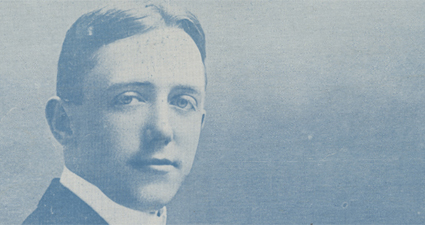 This great American song and dance man spent 56 of his 64 years on the stage. He became, as one of his songs would proclaim, "The Man Who Owned Broadway." He wrote 40 plays and shared production of 150 other plays. He acted in over 1000 performances and wrote over 500 songs. Many of these songs became major national hits.
This great American song and dance man spent 56 of his 64 years on the stage. He became, as one of his songs would proclaim, "The Man Who Owned Broadway." He wrote 40 plays and shared production of 150 other plays. He acted in over 1000 performances and wrote over 500 songs. Many of these songs became major national hits.
He was born George Michael Cohan in Providence, Rhode Island. Contrary to his own songs and beliefs Cohan's birth certificate states that he was born on July 3, 1878. Even his mother would later state that she was sure he was born on Independence Day. He was born into a true Irish family. His paternal side had emigrated from Co. Cork, Ireland. The name had originally been O'Caomhan in Ireland and when they entered the states it was changed to Keohane, which eventually became Cohan. His mother's side also had Irish ancestry with his grandmother being a Breen. George would later work with many Jewish people in the entertainment industry and because his name closely resembled Cohen, a common Jewish name, many people thought that he was Jewish. Any look beyond his name would tell you differently.
Both of his parents Jerry and Nellie Cohan were already established in the Vaudeville circuit when George was born. In those days Vaudeville shows were sometimes called Hibernicon's or Grand Hibernica's stating the hold the Irish had on theater in those days. His older sister Josephine would be his only sibling. As an infant he was sometimes used as a prop during his parents’ performances. By the time George was ten the family was working sketches and shows together and they billed themselves "The Four Cohans." By age 13 George was writing songs, lyrics and plays for their act. By 1894 George was selling his songs to publishers and The Four Cohans were commanding $1,000 a week, a tremendous sum in those days. George had a famous line at the end of each show that became his trademark; "Ladies and gentlemen, my mother thanks you, my father thanks you, my sister thanks you, and I thank you!"
Cohan's Broadway Success
In 1899 George married Ethel Levy who was a popular singing comedienne who joined the Cohan's act. In 1904 George Cohan and Sam Harris formed a partnership that ruled Broadway for fifteen years. He also had his first smash hit with the play Little Johnny Jones. In this play two of his songs became household and vaudeville favorites: "The Yankee Doodle Boy" and "Give My Regards To Broadway." In 1906 another major hit was "You're a Grand Old Rag." Some folks objected to the title of the song and it was changed to "You're a Grand Old Flag." By 1907 George M. Cohan was a name known nationwide. He divorced Ethel and married Agnes Nolan, an Irish-American whose sister was married to Sam Harris.
Besides being a composer, lyricist, actor and song-and-dance man, Cohan was a great businessman. In 1911 Cohan and Harris had 6 hit shows on Broadway and controlled 7 theaters. He was also an avid fan of baseball and was active in the Lambs Club and Friars Club.
George M. Cohan and "Over There"
In 1917 Cohan composed one of America's greatest hit songs. America had just entered World War I, and on the train going into New York he penned the song "Over There." It was an instant success, and 25 years later President Roosevelt presented the Congressional Medal of Honor to him for this war song.
In 1919 an actors' strike closed Broadway. Cohan took this personally, dissolved his partnership with Harris and retired from show business. But it was inevitable that he would comeback as the theater was in his blood. He would write fifteen more plays and musicals but none would be as successful as his earlier efforts. In 1933 he played Nat Miller in Eugene O'Neill's nostalgic comedy Ah Wilderness to much critical success.
In his final years Cohan was sick and in seclusion. Warner Brothers approached him to do a movie on his life. Cohan approved the choice of James Cagney for the role in Yankee Doodle Dandy and later, against doctor's orders, he snuck out of his apartment to catch a screening of the movie at New York's Hollywood Theatre. Sitting in the backrow unknown to the audience Cohan heard the audience laughing and cheering and then returned to his apartment. He died quietly on November 5, 1942.